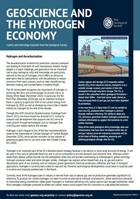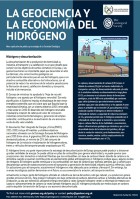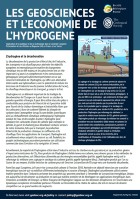12 April 2021
Geoscience and the hydrogen economy
The decarbonisation of electricity production, industry, transport and heating to meet both UK and international climate change targets is a major challenge, and geoscience has an important role to play. Geological skills and knowledge are particularly relevant to the use of hydrogen, which offers an attractive alternative fuel to hydrocarbons, with the potential to reduce emissions from heavy industry, domestic heating, and transportation.
 The UK Government recognises the importance of hydrogen in achieving Net-Zero, and acknowledges its pivotal role in its Energy White Paper (November 2020). In particular, the Ten Point Plan (December 2020) sets out an intention to ensure there is capacity to generate 5GW of low-carbon energy from hydrogen by 2030, as well as developing a town that is heated entirely by hydrogen by the end of the decade.
The UK Government recognises the importance of hydrogen in achieving Net-Zero, and acknowledges its pivotal role in its Energy White Paper (November 2020). In particular, the Ten Point Plan (December 2020) sets out an intention to ensure there is capacity to generate 5GW of low-carbon energy from hydrogen by 2030, as well as developing a town that is heated entirely by hydrogen by the end of the decade.
Through the UKRI Industrial Decarbonisation Challenge Fund (March 2021), the Government has directed £171 million to research and development that supports the UK’s drive for clean growth through technologies such as hydrogen fuel switching and carbon capture and storage.
Hydrogen is also integral to two of the four recommendations made by the Committee on Climate Change’s 6th Carbon Budget (December 2020), which advises ministers on the volume of greenhouse gases the UK can emit under the Climate Change Act (2008).
Hydrogen is an important component of the UK's decarbonisation strategy because it can deliver or store large amounts of energy. It can be used in fuel cells to generate electricity and it can be combusted to provide domestic and industrial heat. Whereas carbon based fuels release carbon dioxide into the atmosphere when they are burned (contributing to anthropogenic global warming), hydrogen produces water and some nitrogen oxides. Hydrogen can replace carbon-based fuels (e.g. oil, gas and coal) to decarbonise parts of our economy such as transport, power generation, chemical production, refineries, and heat.
Our latest policy and technology explainer was reviewed for content and scientific accuracy by our Decarbonisation Working Group. We are working to understand and raise awareness of the various ways that geoscience will underpin the energy transition, particularly with decision makers and stakeholders outside the field. Find out more about our work in this area.
Hydrogen storage: the state of play in 2021
References, resources and further reading
- Underground storage - British Geological Survey, Mineral Planning Factsheet, February 2008
- Underground hydrogen storage in the UK - H. Stone, I. Veldhuis and R. Richardson (Geological Society Special Publications), January 2009
- Analysis of Alternative UK Heat Decarbonisation Pathways for the Committee on Climate Change - Imperial College, August 2018
- Hydrogen in a low-carbon economy - Committee on Climate Change, November 2018
- The Future of Hydrogen - International Energy Agency (IEA) Technology Report, June 2019
- The potential role of hydrogen to help decarbonise the UK energy sector - Energy Research Partnership, July 2019
- New Perspectives in the Industrial Exploration for Native Hydrogen - E. Gaucher (Elements Magazine), February 2020
- Opportunities for Hydrogen Energy Technologies Considering the UK's National Energy & Climate Plans - The Fuel Cells and Hydrogen Joint Undertaking of the European Commission, 2020
- Enabling large-scale hydrogen storage in porous media – the scientific challenges - N. Heinemann et al. (Energy & Environmental Science), January 2021
- A quantitative assessment of the hydrogen storage capacity of the UK continental shelf - J. Scafidi et al. (International Journal of Hydrogen Energy), February 2021
In collaboration with the European Federation of Geologists we have produced a number of translations of this policy document which are available to download here:
| Spanish |
|
French |
 |
|
 |
The role of geoscience in decarbonisation
Decarbonisation, or the reduction of carbon emission intensity across the industry, power generation, transport and heat sectors is essential for meeting both UK and international climate change targets. Our briefing note highlights the important role of geoscience in achieving this goal, whilst considering the barriers that need to be removed to unlock opportunities in this area.
The Role of Geoscience in Decarbonisation